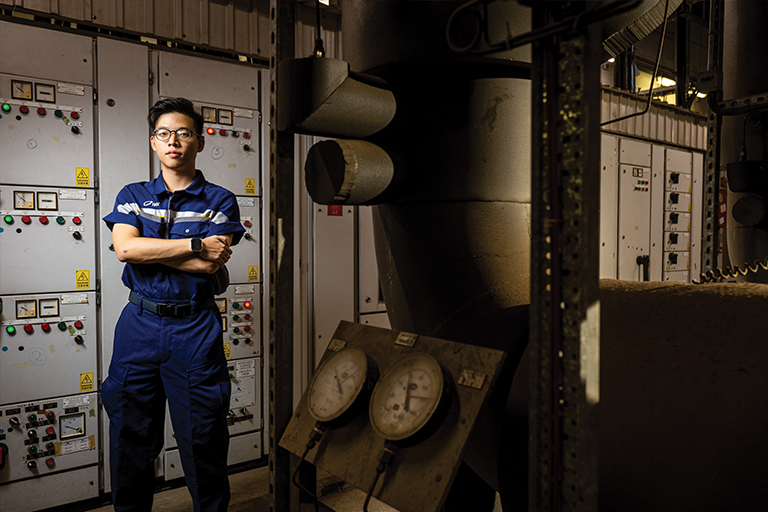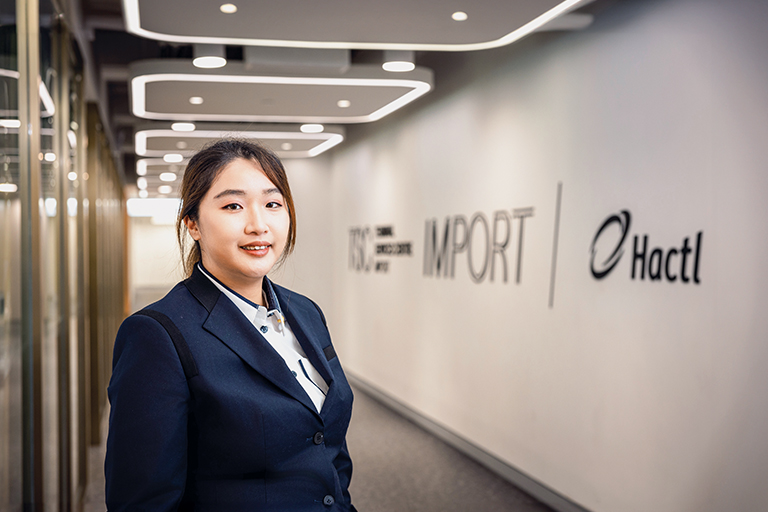To cultivate the next generation of talents in its various departments, Hactl has designed programmes to provide professional training for young people, and pass on practical experience to new joiners through mentorship. June Lo, who has just completed Hactl’s Supervisor Trainee programme, and has been promoted to Supervisor, and Engineer Trainee Peter Yu, share with us how the programmes have challenged them to strive for self-improvement, and enabled them to realise their career aspirations.
Mechanical experts on the apron
Peter has been a car enthusiast since childhood. He studied automotive engineering-related majors during his further education in the United Kingdom. However, he admits that there were few opportunities in Hong Kong for him to apply what he had learned: “Besides working for bus companies, only a few organisations like Hactl have a dedicated engineering team to manage their fleets,” he explains. So, when he saw Hactl’s recruitment drive for the latest batch of trainees, he immediately applied and started his apprenticeship as an Engineer Trainee about a year ago.
After completing the basic training, Peter began working in different teams alongside mentors, to learn and practice. His first post was his dream role in the Mobile Equipment team, where he is responsible for the maintenance of various vehicles and other equipment such as loaders, passenger steps, tractors and dollies. His team mainly operates on the ramp, and their work is crucial to the safety and timely loading and unloading of cargo. “Working on the apron means being exposed to sun and rain every day. Not only people but also machines are prone to wear and tear. So when we receive a maintenance task, we must handle it swiftly to ensure the entire cargo handling process is completed smoothly and on time.”
In the time-critical air cargo handling business, knowledge from experienced mentors is extremely valuable. Peter describes his mentors’ brains as a vast database, as they know all the hidden issues that may happen to vehicles of different types and models. “Just by mentioning a vehicle number, our mentors can immediately tell which team is usually using it, and even the general condition of the vehicle. By asking them, you can get an answer much faster than searching on a computer — it’s incredible!”
While there are many experienced mentors in the team, Peter says there is no age barrier between them. “Maybe because we all love cars!” He continues, “Engineering is all about practice, and our mentors are happy to let us trainees get hands-on. They don’t see us as hindering their work but instead provide valuable guidance and suggestions from time to time.”
Recently he helped design Hactl’s custom-built animal transfer vehicle, the “Animal Limo” — from the initial discussions with contractors about vehicle configuration to ensure smaller animals have a comfortable ride between SuperTerminal 1 and aircraft, to his later coordination with different departments to achieve the vehicle’s attractive exterior design. “This taught me that engineering involves not just vehicles and machinery, but also communication across departments and with contractors.”
Peter will complete the entire trainee programme in a year. Next, he will continue his training journey by rotating between teams under Engineering and Facilities Services, such as Cargo Handling Systems and Electrical and Mechanical.


"This taught me that engineering involves not just vehicles and machinery, but also communication across departments and with contractors."
Peter Yu
Engineer Trainee
Interpersonal Relationship Magician
June Lo has always been positive and proactive towards achieving her goals. She initially joined Hactl through an internship programme with the Hong Kong International Aviation Academy. “I knew about Hactl’s trainee programme for assistant supervisors from the beginning — I knew it offered a clear career path and the chance to intern in different teams within the Operations department. That’s why Hactl was my first choice, and I was glad to eventually join the company as a cargo coordinator, handling import and export cargo documents.” After working in this role for less than a year, she applied to her supervisors to join the trainee programme and become an Operation Trainee.
The Operations department is divided into Cargo Terminal Services and Ground Services teams; June was assigned to the former. During the 18-month training period, she worked alongside assistant supervisors, and rotated through different roles such as document handling, cargo build-up and break-down, and cargo acceptance and release. June loves interacting with people, so she particularly enjoyed her role in overseeing cargo deliveries and collections, as it involved communicating with all kinds of clients, and handling many different challenging tasks.
“There are significant differences between handling cargo deliveries and collections. Often, you only find out on the day whether you’re responsible for inbound or outbound cargo,” June explains. “For example, with cargo collections, my work may involve handling dangerous goods or special cargo like pharmaceuticals or temperature-controlled items. This requires meticulous checks of the cargo details as well as safely and swiftly placing them in the proper storage location. My problem-solving abilities are being tested all the time, so I can never relax and the work is never dull.”
June confides that, in addition to passing on their professional knowledge, her mentors also trained her in how to respond to emergencies, and helped her discover the working methods that best suit her. Initially she worried about leading a team as a junior, and how to handle more senior colleagues; but, through observing her mentors’ communication, she gradually developed a good rapport. “My mentors guided me about the characteristics of each team member, so I could grasp their personalities more easily, and become part of the team quickly.”
At Hactl, most frontline cargo terminal staff are male, and the roles are also generally more physically demanding — so does June have any concerns about being one of the few female staff? “Of course, when it comes to purely physical strength, I’d lose. But cargo work isn’t all about physical ability; being careful and having effective communication and social skills are also important, and are areas in which females are usually strong. The techniques I learned during the training period are also enabling me to handle all issues effectively now.”
"... like pharmaceuticals or temperature-controlled items. This requires meticulous checks of the cargo details as well as safely and swiftly placing them in the proper storage location. My problem-solving abilities are being tested all the time, so I can never relax and the work is never dull."
June Lo
Supervisor, Operations


